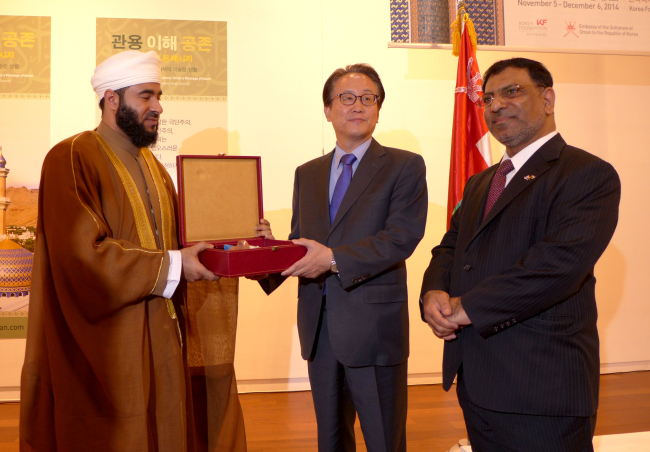The Omani Embassy and the Korea Foundation are cohosting a cultural exhibition, “Tolerance, Understanding and Coexistence: Oman’s Message of Islam,” to commemorate the 40th anniversary of the establishment of South Korea-Omani diplomatic ties. The event is being held at the Korea Foundation Cultural Center Gallery in northern Seoul from Nov. 5-Dec. 6.
Organized by Oman’s Ministry of Endowment and Religious Affairs, the exhibit has been to over 44 countries since April 2011. It features photographs, calligraphy, artifacts and art works that illuminate Islam’s role in Oman’s contemporary society.
The opening reception on Nov. 4 was attended by diplomats, cultural program directors and journalists from both countries.
Organized by Oman’s Ministry of Endowment and Religious Affairs, the exhibit has been to over 44 countries since April 2011. It features photographs, calligraphy, artifacts and art works that illuminate Islam’s role in Oman’s contemporary society.
The opening reception on Nov. 4 was attended by diplomats, cultural program directors and journalists from both countries.

Omani Ambassador Mohamed Al-Harthy said in a keynote speech that the exhibition would promote a better understanding of Islam in Korea, as a religion of peace, coexistence and understanding.
Three-quarters of Omani people are followers of the Ibadi school of Islam, which is different from the Sunni and Shia denominations. As a maritime trade hub located on the southeastern edge of the Arabian Peninsula, Oman thrived as a haven of diverse faiths; mosques, temples, churches, synagogues and shrines ― of Islam, Judaism, Christianity, Buddhism, Hinduism, Sikhism, Jainism, Zoroastrianism and Baha’i ― have coexisted in Oman’s urban centers and sea ports for hundreds of years.
Oman’s Ministry of Religious Affairs said it is committed to promoting dialogues between believers and nonbelievers of all faiths and philosophies to “reflect on their common morality and justice while accepting differences; to guide actions leading to their peaceful coexistence.”
The 1,400-year-old tradition of Islam is facing new challenges brought on by the tide of globalization, modernization and democratization. The Council of Oman declared in 2011, “The more diverse, open and free thoughts are, the more appropriate it is to develop countries, societies and generations. Societies adopting dogmatism, factionalism and fanaticism carry within themselves the seeds of their eventual destruction.”
Oman has been governed by Sultan Qaboos bin Said Al-Said since 1970. His goal was to “modernize without breaking with tradition,” an embassy publication said. Oman has developed rapidly over the past four decades by investing its petroleum revenue in national development projects. Oman ranked at the top of the United Nations’ Human Development Report in income, health and education in 2010.
Oman has a bicameral parliament, consisting of the upper chamber of the State Council and the lower chamber of the Consultative Council. The State Council members are appointed by the sultan while the Consultative Council members are elected by the people on four-year terms.
The sultan has powers over the legislative, executive and judiciary processes within a system of Islamic sharia law.
In the wake of the Arab Spring uprisings in early 2011 targeting undemocratic governments, Oman initiated a series of reforms in its administrative, legislative and executive branches to breathe more freedom into its civil society.
Oman and South Korea’s relations have progressed steadily over the years, bolstered by trade and investment. Oman exports high quantities of crude oil and liquefied natural gas to Korea, which form the basis of its industrial energies. Korea exports cars, high-tech electronic products and construction materials to Oman. Many Korean construction firms are involved in major infrastructure and plant development projects in Oman.
Diplomats at the event noted that the two countries can elevate their bilateral relations to a new level by cooperating on health care, renewable energy, construction and public security. The Royal Navy of Oman lent support in the rescue operation of Korean fishermen taken hostage by Somali pirates in Operation Dawn of Gulf of Aden in January 2011.
By Joel Lee (joel@heraldcorp.com)
-
Articles by Korea Herald





![[Herald Interview] 'Amid aging population, Korea to invite more young professionals from overseas'](http://res.heraldm.com/phpwas/restmb_idxmake.php?idx=644&simg=/content/image/2024/04/24/20240424050844_0.jpg&u=20240424200058)












![[KH Explains] Korean shipbuilding stocks rally: Real growth or bubble?](http://res.heraldm.com/phpwas/restmb_idxmake.php?idx=652&simg=/content/image/2024/04/25/20240425050656_0.jpg&u=)

